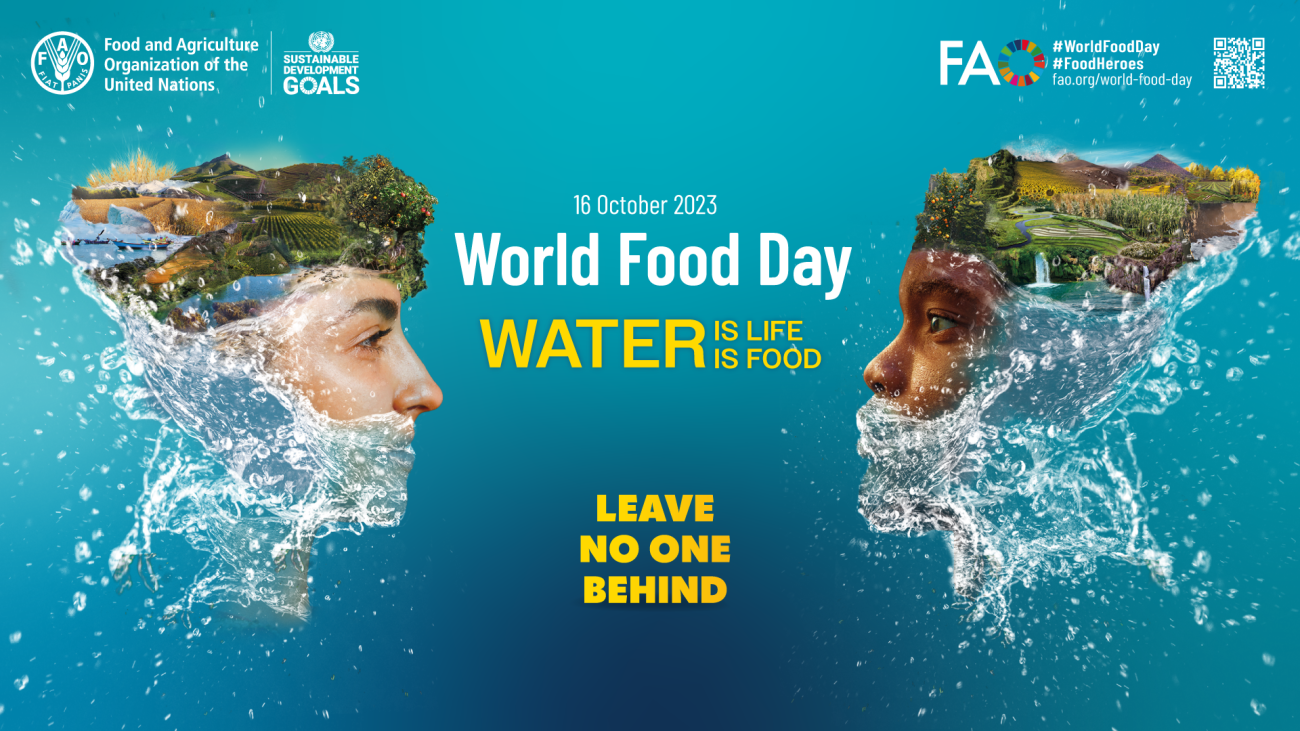World Food Day is one of the most celebrated UN days of the UN calendar, with observances held in over 150 countries worldwide. World Food Day takes place annually on 16 October and promotes awareness of hunger and action for the future of food, people, and the planet.
This year’s World Food Day has the theme “Water is Life, Water is Food. Leave No One Behind.” It celebrates one of the planet’s most precious resources: water, and its central role in the achievement of the 2030 Agenda for Sustainable Development and the Sustainable Development Goals (SDGs).
Water is essential to life on Earth, and it provides the foundation of our food. It covers the majority of the Earth's surface, makes up over 50 percent of our bodies, supports livelihoods, and produces our food. Indeed, agriculture accounts for 72 percent of global freshwater withdrawals. But like all natural resources, fresh water is not infinite. We all need to stop taking water for granted and start improving the way we use it in our daily lives: the food we eat, and how that food is produced.
FAO encourages all international and national partners and development actors to come together for joint water action to improve the way we use water resources in our daily lives.
What can governments do to manage water sustainably for the future of food?
• Prioritize water in policies and planning;
• Understand water challenges;
• Build national water roadmaps and strategies;
• Invest in capacity development and innovative solutions;
• Manage water resources in an integrated way that takes into account all uses from fisheries to forestry, agriculture and other sectors;
• Engage in the Global Dialogue on Water Tenure to shape principles for responsible governance of water resources.
What can researchers, civil society and private sector actors do to manage water sustainably for the future of food?
• Foster innovation and support initiatives to produce goods with less water;
• Inform water and agriculture policies and advise decision-making processes, advocating for change, accountability and inclusion;
• Share knowledge, data and skills;
• Understand where water comes from and where it goes;
• Cut down pollution in businesses.
What can farmers do to manage water sustainably for the future of food?
• Use and dispose of pesticides and fertilizers correctly;
• Manage water more efficiently, starting with regularly checking and repairing leaks or overflows and insulate the pipes for energy savings;
• Adopt sustainable and climate-smart agricultural practices to improve efficiency;
• Share water-gathering duties equally between men and women, boys and girls, so all have time for other activities, including school.
What can all of us do to manage water sustainably for the future of food?
• Choose fresh and seasonal fruits and vegetables – they usually take less water to produce;
• Reduce your food waste. It means less water goes to waste;
• Save water. This includes using less energy, since much of it is generated using water;
• Shop sustainably;
• Don’t pollute water, and take part in clean ups if you can.
Nabil Gangi, Officer-in-Charge for the FAO Regional Office for Europe and Central Asia, remarked on World Food Day that “integrated and sustainable water resources management can become the direct accelerator of at least three out of five pillars of the Green Agenda for the Western Balkans, namely Pillar 2 on Circular Economy, Pillar 3 on Depollution: Air, Water and Soil, and Pillar 4 and Sustainable Food Systems and Rural Areas, with the links to the remaining two pillars on Decarbonisation and Climate Resilience, and Biodiversity: Protection and Restoration of Ecosystems. This year’s World Food Day campaign looks at practical and actionable solutions to produce more food and other essential agricultural commodities with less inputs, especially less water.”
On World Food Day, reflect on the importance of water to our lives and what can be done to improve access to and management of water resources.
Links
World Food Day
World Food Day video challenge for Europe and Central Asia: ‘Embody the change – Join the wave’






